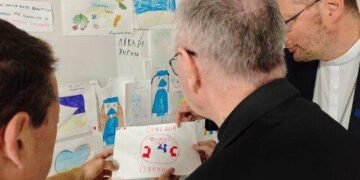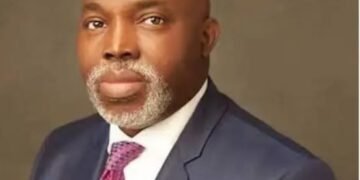By Paul Chika Emekwulu
Have you ever heard either a classmate or a school mate of yours or just people or even yourself saying that mathematics is a matter of formula? Such people are of the opinion that once you know the formula relating to a math problem, the solution to the particular math problem is not a problem. Unfortunately, even some subject teachers share the same opinion. Personally, I heard such recently coming from students of a local girls’ secondary school.
The same was said during my own time decades ago and some, if not most of the readers reading this today have their own stories. Future generations will still have their own stories as well unless enough conversation is held and enough action taken towards demystification.
Here are more myths:
(1) Science students are not good in written and spoken English.
(2) Once you are good in mathematics, you are good in all science subjects.
(3) Those students labeled “Igbo, Igbo, BK” (Bible Knowledge now Christian Religious Knowledge (CRK)) are not good in science subjects.
(4), Students that excel in mathematics are not romantic.
(5) Students that are good in mathematics are more prone to brain problems due to too many formulae in their heads.
(6) Developing love for and reading novels are for those students who hope to offer or are already offering English Literature in the West African School Certificate.
There are more myths.
Now, here is my story.
That day was hot afternoon of Thursday, February 8, 2024. I was on my way home following a visit to a pharmaceutical store in town. During this time the construction of Ekwulọbịa flyover by Governor Charles Chukwuma Soludo’s administration was going on. All the four approach roads to Ekwulọbịa Urban market were being scrapped as a preparation for a macadamized status. Because of this I had to take a detour in order to avoid a section of Awka – Ekwulọbịa – Ọlụ (Orlu) Road that was experiencing congestion.
On my way back home, six girls on their way home from school thumbed for a lift. They looked so tired but still energetic enough to participate in a meaningful conversation. I had to pick them up and I later found out that they are students of a local girls’ secondary school.
“Why are you all going home so late?” I asked the girls.
“We are so late going home because we are taking “mock” exams.
“Have you sat for mathematics?”
“No,” the girls answered in unison. One of them cut in to say that they have not sat for English Language as well.
Mathematics and English are compulsory subjects in both Junior and Senior School Certificate Examinations. At times you cannot talk of mathematics without talking of English Language or talk of English Language without talking of mathematics. We didn’t have enough time to talk about reading novels and how such could help one in passing English Language in flying colours.
This is because novels, the language of expression notwithstanding, build language skills in the areas of vocabulary, spelling, grammar and comprehension etc. Unfortunately, the cellular phone has taken over the reading culture and the cellular phone now seems to be the new novel. Look around you and judge for yourself. One thing is clear and will continue to be so. This is for these girls and the rest of the students out there. The cellular phone is a wonderful thing to have but it is not a wonderful thing to make it your best friend because there are better friends and a book is one of them. Just drop your phone and read something!
I have more questions to ask so I continued with my questions.
“Are you scared of mathematics?”
I asked the girls.
“Yes,” they all responded.
“What is scaring about mathematics?” I continued.
“The formula,” they all responded.
“Once we know the formula we can get the answer,” one of them interjected in a very confident tone.
I felt like, “Wow, we are at it again.” Guess who they reminded me of?
“Kasie.” You guessed right. Kasie then was a JSS 2 student of a local secondary school who I met a few years ago in a similar circumstance. Kasie said it first concerning his home work class assignment on polygons. Kasie’s homework assignment was to find the measure of each of the interior angles of a regular nine sided polygon. Kasie, like these girls, wanted the formula for his polygon assignment. He got the formula he wanted but taking a horse to the river is one thing and getting the horse to drink is another. Kasie was taken to the river but he couldn’t drink. He got the formula but couldn’t solve the problem. Like Kasie, these girls, having found themselves in a similar circumstance needed something more than just formula.
Like Kasie, these girls are saying the same thing. Now, coming from a second source does it make it a true statement? Of course not!
What majority has is power and not necessarily reason and this is why I absolutely agree with John L. Mason, the author of An Enemy Called Average when he says, “The majority, at times is a group of highly motivated snails. If a thousand people say something foolish, it is still foolish. Truth is not dependent on consensus of opinion.”
I will continue to say that it is a wrong mindset among students to see the formula as the ultimate and I cannot say it enough. Without even considering the fact that every conceivable math problem doesn’t have to have a numerical response, to Kasie and these girls formula is a magic wand.
Consider this example with two cylinders A and B.
Given two cylinders A and B, the same height, the same radius and therefore, the same volume. How can the height and radius of B be changed in order for the two cylinders to still have same volume?
To answer this question a formula is not the ultimate though relevant. Rather, what you need most is moving things around and how do you move things around? At times you move things around by trial and error, at times you move things around by experimenting, at times you move things around by rejecting and or accepting.
At times you have to reason things out and reasoning things out may not necessarily involve adding, subtracting, squaring, multiplying, dividing and substituting etc. At times answer to a math problem could be just: “Not necessarily”, “Never”, “Always”, “Not necessarily”, “Sometimes”, “Not always” etc. rather than a numerical response. This is after you have worked out the problem either with or without formula.
Continuing within myself I said, “Again a teachable moment is here.” Like good music, I always recognize teachable moments whenever one presents itself and this was one of them. To me it was time to teach, to me it was a special moment and to me it was time to seize the moment. “It has to be seized,” I concluded.
At this point I turned to them and said, “I am writing a book on what she just said and the title is, “I Just Need the Formula to Get the Answer.” By the way this book has a detailed account of the question on cylinders A and B.
These girls never expected to hear what they just heard. They are not used to such book titles. Moreover, such book titles are not available in the market. These students and others are used to titles such as the following:
1) General Mathematics
2) Secondary mathematics
3) Essential mathematics for senior secondary schools
4) Fundamentals of secondary mathematics
5) Teach yourself Algebra
6) Teach yourself mathematics
7) Teach yourself Arithmetic etc.
To these girls and many others like them around the country, “I Just Need the Formula to Get the Answer” doesn’t sound mathematical enough, for it sounds much more like an English novel.
So, when I said that I was writing a book on this wrong idea that mathematics is all about knowing the formula, all I got in return from the girls was a stare and the meaningful silence that followed. To break the silence I asked,
“Have you all been taught the volume of a cylinder?”
To avoid embarrassing them I stated the formula for the volume of a cylinder as pie multiplied by the radius of the cylinder squared, multiplied by the height of the cylinder.
We also talked about the formula for the area of a circle as pie radius squared and at the same time listening for comments. There were none and that encouraged me to ask the following question:
“So, if I give you a problem related to finding the volume of a cylinder you’ll get the answer because you have been given the formula?”
“No-o,” they all responded in a quick fashion without hesitation.
“But you said that once you are given the formula you’ll get the answer.”
At this time they all retracted their statement and that alone rendered their initial statement invalid. The truth is that they found themselves in a controversial situation. It cannot be a situation of “yes” and “no” simultaneously. “Yes”, because they initially said at the beginning of the conversation that once they are given the formula, the answer is guaranteed and “no” because after our detailed discussion they are now saying that, “Providing a solution to a math problem is not necessarily a matter of knowing the formula.”
To me, that is giving up.
Before they all left we jointly arrived and reinforced one important conclusion which is: “Providing a solution to a math problem is not necessarily a matter of knowing the formula.”
To provide a solution to a math problem, a part of it is understanding the problem and a part of understanding the problem is understanding the logic and a part of understanding the logic is understanding what comes next and what comes next could be the end or a part of arriving at the desired result.
Let this be a message to the rest of the students out there. “He who has ears to hear, let him hear (Matthew 11:15).
Were it to be in a court of law, with that response they have withdrawn their case. No more arguments. Providing a solution to a math problem is not necessarily a matter of knowing the formula. Rather, it is a matter of first, understanding the problem, the knowledge of formula comes later. Case closed!









































